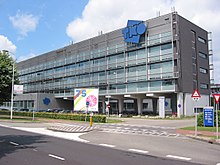Dutch Organization for Applied Scientific Research
|
|||
|---|---|---|---|
| legal form | Public corporation | ||
| Consist | since 1932 | ||
| Headquarters | The hague | ||
| Employee | approx. 3900 | ||
| Website | www.tno.nl | ||
The Netherlands Organization for Applied Scientific Research (Dutch: Nederlandse Organizatie voor toegepast-natuurwetenschappelijk onderzoek ), TNO for short , is an applied science organization in the Netherlands .
The TNO Act, originally dated October 30, 1930, defines the tasks, the organizational form, the legal aspects and the relationship with the government. The Board of Directors , the Directorate and the Defense Research Council of the TNO are appointed and controlled by the government . The TNO's legal mandate is to make applied natural science and technology in connection with social science subservient to general issues, whereby it is expressly obliged to provide all-round support and international cooperation . The TNO plays an important role in networking different areas of politics , universities , companies of all sizes and other research institutions.
In addition to several operating sites at its headquarters in The Hague , the TNO has others in the Netherlands in Apeldoorn , Bergen op Zoom , Delft , Den Helder , Eindhoven , Enschede , Groningen , Helmond , Leiden , Rijswijk , Soesterberg , Utrecht and Zeist , as well as outside of Brussels , Doha , Oranjestad , Toronto and Yokohama . The Hoofddorp headquarters were closed in 2014 and moved to Leiden .
TNO has a balance sheet total of around 600 million euros, receives around a third of its proceeds from the public sector, and has a majority stake in dozens of companies. In German-speaking countries, TNO held a ten percent stake in the Joanneum Research research company in Styria . In 2014 the state of Carinthia took over their shares. Together with the Joanneum, the VTT in Finland and the Tecnalia in Spain , the TNO runs the Joint Institute for Innovation Policy (JIIP) in Brussels. These investments took place in 2004 and 2009.
Since 2005, the TNO has been divided into five main areas, which in turn are divided into institutes:
- Quality of life (this department is a WHO collaborating center for occupational medicine )
- Defense and Security (strategic partner of the Dutch military)
- Science and industry
- Environmentally friendly construction and geosciences
- Information and communicationtechnology
Individual evidence
- ↑ a b c Annual Report 2012 (PDF; 2.97 MB) TNO. Retrieved December 27, 2013.
- ^ TNO-wet ( Dutch ) Ministerie van Binnenlandse Zaken en Koninkrijksrelaties. Retrieved December 27, 2013.
- ↑ Public Governance in the Netherlands (PDF; 3.77 MB) In: Public Governance in the Länder, Part II: Country Profiles . Federal Ministry for Transport, Innovation and Technology . P. 55 ff. December 2008. Accessed December 27, 2013.
- ↑ Locaties . TNO. Retrieved December 27, 2013.
- ↑ Shareholder . Joanneum Research Forschungsgesellschaft mbH. Retrieved December 27, 2013.
- ↑ Archived copy ( Memento of the original from March 4, 2016 in the Internet Archive ) Info: The archive link was inserted automatically and has not yet been checked. Please check the original and archive link according to the instructions and then remove this notice.
- ^ Alliances and Collaborations . Corporación Tecnológica Tecnalia. Retrieved December 27, 2013.
- ^ History . Joanneum Research Forschungsgesellschaft mbH. Retrieved December 27, 2013.
- ↑ World Health Organization (Ed.): PRIMA-EF: Guidelines for the European framework for action for psychosocial risk management: A manual for employers and employee representatives . Federal Institute for Occupational Safety and Health , 2009, ISBN 978-3-88261-647-7 ( PDF; 651 kB [accessed on December 27, 2013]).

